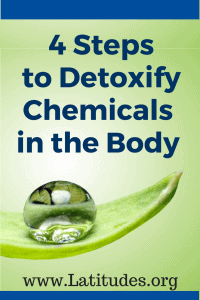4 Steps You Can Take to Detoxify Chemicals
William Shaw, PhD
 Dr. William Shaw is board certified in the fields of clinical chemistry and toxicology by the American Board of Clinical Chemistry. Before he founded the Great Plains Laboratories Dr. Shaw worked for the Centers for Disease Control and Prevention (CDC).
Dr. William Shaw is board certified in the fields of clinical chemistry and toxicology by the American Board of Clinical Chemistry. Before he founded the Great Plains Laboratories Dr. Shaw worked for the Centers for Disease Control and Prevention (CDC).
Every day, we are exposed to hundreds of toxic chemicals through products like pharmaceuticals, pesticides, packaged foods, household products, and environmental pollution. As we have become more exposed to chemical-laden products and to toxic chemicals in food, air, and water, we have been confronted with an accelerating rate of chronic illnesses like cancer, heart disease, chronic fatigue syndrome, chemical sensitivity, autism spectrum disorders, ADD/AD(H)D, autoimmune disorders, Parkinson’s disease, and Alzheimer’s disease.
Because exposure to environmental pollutants has been linked to many chronic diseases, The Great Plains Laboratory has created GPL-TOX, a toxic non-metal chemical profile that screens for the presence of 172 different toxic chemicals including organophosphate pesticides, phthalates, benzene, xylene, vinyl chloride, pyrethroid insecticides, acrylamide, perchlorate, diphenyl phosphate, ethylene oxide, acrylonitrile, and more.
This profile also includes Tiglylglycine (TG), a marker for mitochondrial disorders resulting from mutations of mitochondrial DNA. These mutations can be caused by exposure to toxic chemicals, infections, inflammation, and nutritional deficiencies.
If you or a patient has had a GPL-TOX profile and/or a Glyphosate test run and found moderate-high levels of any compounds, there are things you can do to help your body eliminate the toxins and to prevent future exposures.
4 Steps You Can Take to Detoxify
1The first steps to reducing the amount of toxins presently in the body are to switch to eating only organic food and drinking water that has common toxins, including pesticides filtered out. Most conventional food crops are exposed to larger and larger doses of pesticides and herbicides, and by switching to organic you will prevent exposure to hundreds of these toxicants. Many of these chemicals have also contaminated our water supplies. Installing a high-quality water filtration system in the home that eliminates them is important to do and there are several options available.
2The next step to avoiding future exposures is to change the products you use on a daily basis – from food and beverage containers to beauty and cleaning products. Instead of using plastic water bottles and food containers, switch to glass or metal. Never microwave food in plastic or styrofoam containers and do not drink hot beverages from plastic or styrofoam cups. Make sure your shampoo, soaps, lotions, and other beauty products are free of phthalates. Use cleaning products made from natural ingredients or make your own at home.
3To eliminate toxins from the body, we highly recommend exercise and the use of saunas, especially infrared sauna therapy to rid many chemicals through sweat. Infrared sauna is superior to conventional sauna because it reaches deeper into the body, increasing the circulation in the blood vessels, and causing the body to start to releasing many of the chemicals stored in body fat.
4There are two supplements that are particularly useful in helping the body detoxify. Editor’s Note: These are general recommendations; make sure they are not contraindicated for your specific medical condition. Check with a knowledgeable practitioner for advice on dosage. The first is glutathione, or its precursor N-acetyl cysteine. Glutathione is one of the most common molecules used by the body to eliminate toxic chemicals. If you are constantly exposed to toxicants your stores of glutathione could be depleted. The second supplement is vitamin B3 (niacin). Some may not enjoy the flushing that can happen when taking niacin, however, this flushing is from the blood vessels dilating, which is useful in the detoxification process. If sensitive to the flushing, start with the lowest recommended dose and work up from there.
For more on Great Plains Laboratory’s Toxic Non-Metal Chemical Profile see here.










Extremely bad advise to give to take niacin B3 when Someone has Gilbert’s syndrome.
Anne, you make a good point that most nutrients are not advised for every condition, and beyond that, dosage makes a difference–plus there may be contraindications. I’m adjusting the article to address this concern; thank you for writing.